Commonwealth summit: Sri Lanka rejects UK’s criticism over rights abuse
Sparks fly between summit host and Britain over war crime allegations.
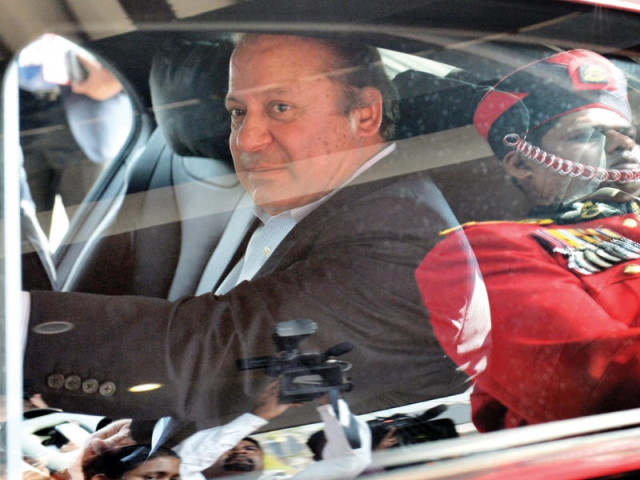
A guard is reflected on the vehicle of Prime Minister Nawaz Sharif as he leaves a working session of the Commonwealth Heads of Government Meeting in Colombo on Saturday. PHOTO: AFP
Sri Lanka has shunned Britain’s demand for an inquiry into human rights abuses committed against Tamils.
“Pressure won’t do anything.... It’s much better to wait rather than demand or dictate,” said Sri Lankan President Mahinda Rajapakse on Saturday at a press conference here where he was chairing a Commonwealth summit.
Sri Lanka must be trusted to conduct its own investigation into war crimes allegations and warned against international pressure on his regime’s human rights record, he stressed, adding, “People in glass houses must not throw stones.”
The three-day gathering has been overshadowed by allegations of war crimes committed by Sri Lankan troops at the end of an ethnic war in 2009.
Earlier, during the CHOGM session, allegations against Sri Lanka’s war crimes led to an impending conflict between Britain and the host of Commonwealth summit, as the country received strong criticism over the use of state-backed torture against Tamils.

Later, in a news briefing, UK Prime Minister David Cameron asked for a “credible, transparent and independent investigations into alleged war crimes.”
“Let me be clear, using our position in the Human Rights Council we will work with them and call for a credible international inquiry into alleged war crimes if the government fails to do so by March next year,” said Cameron.
Senior minister Basil Rajapakse was more direct in his statements against UK’s demand and said such an inquiry would ‘definitely’ not be allowed. Basil is also Rajapakse’s brother and the secretary in the defence ministry. The president himself holds the portfolio of the defence ministry, making him directly responsible to all such allegations.
Backing Colombo
Commonwealth countries seemed divided on the matter with Prime Minister Nawaz Sharif expressing support to Rajapakse’s government.
In his address at the summit, Nawaz discussed weak economy, poverty, energy shortages, natural calamities and militancy among Pakistan’s various challenges. He said equitable development was one of the most significant contemporary challenges confronting the countries.
Australia and New Zealand have also backed Sri Lanka. Australian premier Tony Abbott, in his address, said countries recovering from conflict should not be isolated.
On Friday, Cameron had skipped CHOGM’s opening ceremony to visit Jaffna, the heart of the conflict. “I’m the first head of state to visit the north of Sri Lanka since 1948,” Cameron said in a tweet.
A UN report suggests the Sri Lankan military may have killed up to 40,000 civilian Tamils in the last few months of the 30-year war.
UK media has brought the issue of alleged human rights abuses to the fore. A horrifying nearly nine-minute documentary, released on BBC Newsnight days before the meeting, revealed allegations of sexual torture by the military against ethnic Tamils as recently as this year.
The stories of unconceivable abuse are confirmed by medical practitioners in the UK. The documentary says the allegations amount to a ‘crime against humanity’ which may be referred to the International Criminal Court for further investigation.
The summit opened up with subtle references to the crisis at hand, but steered clear from any direct confrontation. The Sri Lankan president, seemingly stressed, greeted the delegates holding his good luck gold charm in his left hand, but the luck seemed to have worn out by the end of the first day.
The Commonwealth meeting has also led to rising concerns about lack of media freedom in Sri Lanka, with journalists being given very limited access to the CHOGM events. BBC and Channel 4 News have been most vocal in their concerns.
Many in Sri Lanka see the UK’s concerns with much scepticism. When Channel 4 crew visited the media centre on Friday, questions thrown at them by local journalists implied the documentary was biased because of “European funding to produce the film.”
Moreover, Mauritius has backed out from hosting CHOGM 2015 because “almost nothing has been done” following revelations on civilian casualties. The country had already boycotted CHOGM 2013 because of Sri Lanka’s human rights record.
Published in The Express Tribune, November 17th, 2013.


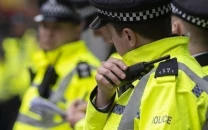

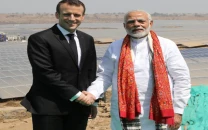
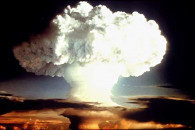
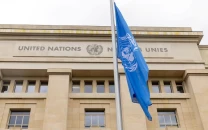












COMMENTS
Comments are moderated and generally will be posted if they are on-topic and not abusive.
For more information, please see our Comments FAQ